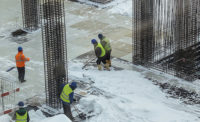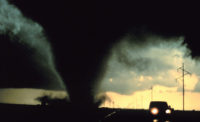 Worried about the possibility of severe weather striking your area? Wondering how you’ll handle the consequences?
Worried about the possibility of severe weather striking your area? Wondering how you’ll handle the consequences?
The Electrical Safety Foundation International (ESFI) has launched a new collection of severe weather safety resources that will enable people to prepare for storm-related hazards and lower the risk of deaths, injuries and property loss.
Informational resources include a Hurricane Safety Guide, a Tornado Safety Guide, an illustrated Portable Generator Safety fact sheet, a Flood Safety fact sheet and a Downed Power Line Safety guide. All resources can be downloaded free of charge on ESFI’s website.
“Severe weather has been prevalent across the country in recent months, and it is critical to remember that there are electrical hazards that are hidden throughout the home before, during and after these storms,” says ESFI president Brett Brenner. “Before flipping a switch or plugging in an appliance, have a licensed electrician check the house wiring and appliance to make sure it is safe to use.”
Submerged Electrical Appliances
- Take care when stepping into a flooded area, and be aware that submerged outlets or electrical cords may energize the water, posing a potentially deadly trap.
- Electrical items such as circuit breakers, fuses, GFCIs, receptacles, plugs and switches can malfunction when water and silt get inside. Discard them when they have been submerged.
- Have an electrician inspect electrical appliances that have been wet, and do not turn on or plug in appliances unless an electrician tells you it is safe. Electrical equipment exposed to water can be extremely dangerous if reenergized without proper reconditioning or replacement.
Downed Power Lines
- Always assume fallen power lines are energized. Stay at least ten feet away from a downed power line and any nearby objects it may be touching, such as a fence or a tree limb.
- Contact your utility company immediately to report downed power lines outside your home.
- Never touch a person or object that is in direct or indirect contact with a downed power line. Instead, call 911 immediately.
- Never attempt to move a downed power line – leave it to the professionals.
Portable Generators
- Do not operate a portable generator in your home, basement, or garage. Generators can very quickly produce high levels of carbon monoxide, which can be deadly.
- Be sure that the generator is dry and properly grounded. Plug appliances directly into the generator to prevent back feed along the power lines.
- Make sure that there is at least one working carbon monoxide detector in your home. Test the batteries at least twice a year, at the same time smoke detector batteries are tested.
- Warn those in your home not to open windows while a generator is operating outside.
Visit ESFI’s website for the comprehensive collection of severe weather safety resources.


